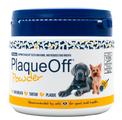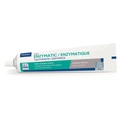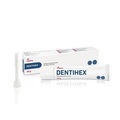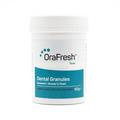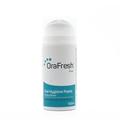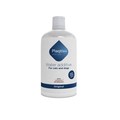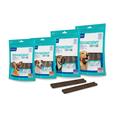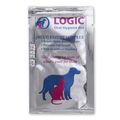Why do vets care about our pet’s teeth?
So our dog or cat’s breath smells and they have plaque building up. It’s been like this for a while though and we’re used to it. Does it really matter?
Actually it does. Plaque is a build up of bacteria on the teeth and gums and these bacteria can easily enter the bloodstream through the gums. In fact, dogs with stage 3 and 4 periodontal disease (moderate or severe plaque build up and inflammation of the gums) have been shown to have underlying organ damage as a result of this. Whilst this has not been definitely proven to be related to plaque build up, it is heavily suggestive of this as the cause. Blood markers that monitor Kidney and Liver function and damage were significantly elevated in dogs with 3rd and 4th stage disease in a recent study.
So what should I do?
Brushing
This is by far the best way to prevent and clear plaque. We have many specialised toothbrushing kits for dogs and cats on our website and you can buy pet friendly toothpaste which they’ll really enjoy the taste of. Start by feeding this just as a treat twice a day then after a few days rub it on your pet’s teeth, eventually you should be able to introduce the brush. Ideally this should be done at least once daily for it to be effective enough to prevent dental problems. More information on teeth brushing can be found in our blog, ‘How to brush your dog’s teeth’.
Diet
Dry food is generally better for teeth than wet food. The physical action of crunching the kibble can help remove plaque and dry food is less likely to get stuck in between the teeth, which predisposes to plaque buildup. There are special dental diets too that contain additional ingredients to improve dental hygiene and help physically break plaque off your pet’s teeth. Most of these must only be given alongside your vet’s advice though.
Treats and chew toys
The act of chewing special dental treats or chew toys helps break plaque off the teeth. Dogs can benefit from treats like Dentastix and toys like the Nylabone Dental range. You should always supervise your dog using any non-edible toys as rarely these can break apart. Cats don’t tend to enjoy chewing by nature, but you can use a variety of dental treats which help improve oral hygiene.
Supplements
These help by reducing the bacteria in your pets mouth. They unfortunately don’t break plaque off, but as part of a dental routine can help reduce the amount of plaque that builds up. Many have the added bonus of improving the smell of your pet’s breath too! Here is a link to our Dental Supplement Range.
Veterinary care
If your pet’s dental disease is severe enough then they may need a scale and polish procedure performed at your vets, possibly with extractions, before trying the above mentioned. Hard on plaque cannot be removed except with a dental scaler and this requires an anaesthetic in animals. Contact your vet for advice on this.
So many options! Which should I choose for my pet?
You should use a combination of brushing, dietary care and oral treats/chews and supplements to give your pet’s teeth the best chance. However this can be unrealistic and you should use as much or as little as you can. If you are managing to brush then you may not need any other dental hygiene products. However some pets really struggle with the brushing process and using chew toys or dental treats is a great alternative. If you would like individual advice about your pet’s dental care then please contact our team on [email protected].
If you've found this article helpful, you might be interested to read our other related articles: How to improve your dog's dental health, Should I brush my cat's teeth?, Easy Dental care for cats, How to brush your dog's teeth, Diets for a healthy mouth, Dental care for dogs & cats.
Written by: Dr. Nick Garside BVetMed MRCVS

